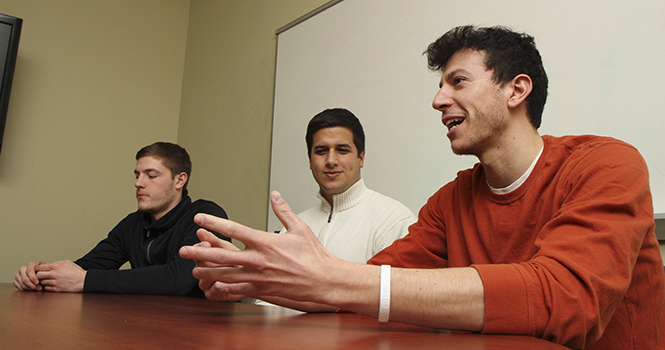From FaceWash to SimpleWash
Kent State computer science majors David Steinberg (right), Daniel Gur (middle) and Camden Fullmer (left) are the developers of “Facewash,” a Facebook app which allows users to search through their activity and content and remove potentially unwanted materials from public view. Photo by Shane Flanigan.
February 12, 2013
More than 200,000 Facebook users from all parts of the world have used FaceWash, and the trio of Kent State students who created it is ready to take things to the next level.
Camden Fullmer, senior computer science major, Daniel Gur, senior computer science major and David Steinberg, senior electronic media major, are the creators of FaceWash, which allows users to search their Facebook profiles for undesirable content and to edit or delete it.
However, the team is ready to expand from Facebook to Twitter. Because of this expansion, they renamed the online app SimpleWash on Feb. 1. The name change came less than a month after FaceWash’s official open.
“As we began expanding our service to Twitter and beyond, we wanted to not appear solely attached to Facebook and solidify a brand that represented exactly what we are: a simple way to wash your online social history,” Gur wrote in an email. “This was a unanimous decision as a team.”
Fullmer said a beta version of SimpleWash’s Twitter service will be up and running this week, but will only be open to a few hundred users. The official announcement will be made on SimpleWash’s Facebook and Twitter pages.
Since the name change, Gur said they have added new languages to the search capability, improved search algorithms and added many new terms.
Logging into the Twitter version of the app will work the same as the process for logging into the Facebook version and will work similarly to highlight alarming tweets a user has tweeted.
“While the base of search will remain the same to provide broad coverage of undesirable content, there will definitely be some new factors that play into how we identify something as questionable,” Fulmer said. “These will stem from tweet patterns across Twitter.”
The system will support a “load more” feature to look back at older tweets, and users will be able to search using their own words or phrases. Both of these features are currently supported for the Facebook version.
Image recognition for SimpleWash is still in the works, but the student programmers are making progress. The three attended a “hackathon” on Feb. 1 at the University of Michigan, where they said they made great strides.
Steinberg said they will be building and testing extensively with sample data before a beta version is released to the public.
Gur said they have serious interest in partnerships, but cannot disclose any information about offers they are currently receiving.
“We are always dreaming up new apps and ideas and we have had numerous in the last few weeks,” Fullmer said. “As they grow to full-fledged apps, we will let the public know.”

























